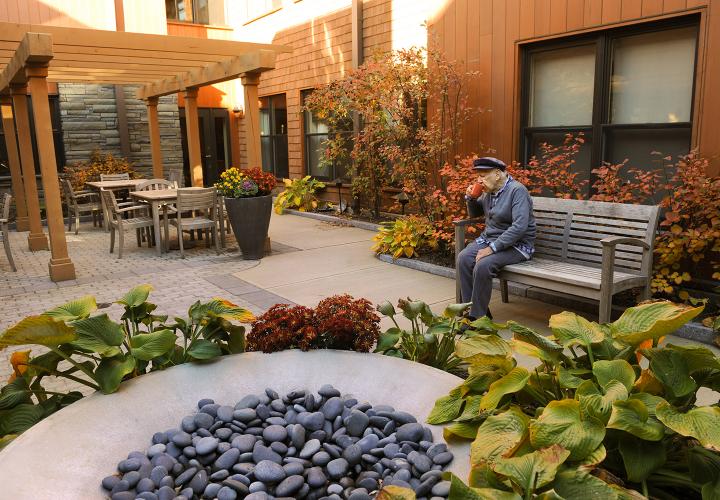Thoughtful Teams Supplying Relied On Alzheimers Care Charlotte Options
Thoughtful Teams Supplying Relied On Alzheimers Care Charlotte Options
Blog Article
Expert Tips for Giving Top quality Alzheimer's Treatment in your home
Caring for an individual with Alzheimer's condition at home presents distinct challenges that need both understanding and tactical preparation. As we check out these specialist ideas better, it comes to be clear that a thoughtful strategy can significantly influence the high quality of life for both the caregiver and the individual getting care.
Understand Alzheimer's Condition
Alzheimer's disease, a dynamic neurodegenerative condition, profoundly affects cognitive function and day-to-day living tasks. It primarily influences memory, assuming, and behavior, leading to a steady decline in the capacities needed for independent living. Early signs usually consist of forgetfulness, difficulty in problem-solving, and obstacles in finishing acquainted tasks. As the condition progresses, people might experience disorientation to time and area, damaged judgment, and modifications in state of mind and personality.
The etiology of Alzheimer's is complicated, entailing the buildup of amyloid plaques and tau tangles in the mind, which disrupt neuronal interaction and bring about cell death. Danger aspects consist of age, genes, and way of life choices, with the bulk of situations occurring in people over 65. Understanding of these facets is important for caregivers, as recognizing the problem can promote better assistance and treatment methods.
Furthermore, Alzheimer's condition not only affects the specific but additionally has considerable psychological and logistical effects for family members. Recognizing the stages of the illness permits caretakers to prepare for obstacles and adapt their strategy, making certain that the needs of those impacted are met compassion and understanding. This foundational expertise is crucial for promoting high quality care at home.
Develop a Routine
Developing an organized daily routine can significantly boost the quality of life for people dealing with Alzheimer's condition. Establishing constant patterns helps to reduce confusion and anxiousness, supplying a feeling of protection and knowledge. A daily timetable should include normal times for dishes, activities, and remainder, which can aid people anticipate what to expect throughout the day.
Including basic, acquainted tasks into the regimen can advertise a sense of success and self-reliance. Activities like horticulture, cooking, and even simple family jobs can be advantageous. It is necessary to tailor these activities to the person's rate of interests and capabilities, guaranteeing involvement without irritation.
Moreover, flexibility within the regimen is key. While consistency is necessary, enabling adjustments based upon the person's mood or energy levels can aid keep a favorable environment. Motivate involvement in social communications, whether via household visits or neighborhood tasks, as these can give excitement and link.
Enhance Communication Skills
Reliable interaction is important for maintaining meaningful connections with people coping with Alzheimer's condition. As cognitive abilities decrease, standard conversation may end up being difficult. Caretakers should adjust their interaction strategies to promote understanding and connection. Alzheimers Care Charlotte.

Energetic listening is important. Program real passion by preserving eye call and nodding to recognize their sensations or ideas. Avoid suggesting or fixing, as this may cause stress. Instead, verify their feelings and reroute the discussion carefully if required.
Using aesthetic aids, such as images or created pointers, can also improve understanding. Urge participation in activities that stimulate discussion, such as reminiscing regarding previous events or checking out picture cds.
Produce a Safe Atmosphere
An encouraging setting plays a significant role in the health of people with Alzheimer's condition. Producing a risk-free home setting is important to decrease dangers and improve the high quality of life for both the private and their caregivers. Begin by evaluating the living room for prospective dangers. Get rid of tripping risks such as loose carpets, electric cables, and mess. Ensure that paths are well-lit and clear to avoid falls.
Install security locks on doors and home windows to avoid straying, which is a typical issue in Alzheimer's patients. Furthermore, think about making use of non-slip mats in bathrooms and install grab bars for included support. Identifying areas and vital items can assist individuals navigate their environments much more quickly.
Emergency situation contacts must be clearly published near phones, and a medical sharp system can supply comfort. Think about using childproofing procedures for harmful materials and sharp things. Frequently inspect smoke detectors and carbon monoxide alarm systems to guarantee they are working. Generally, customizing the home atmosphere to the unique needs of the individual with Alzheimer's not just advertises safety yet additionally encourages freedom and comfort.
Seek Support and Resources
Accessing assistance and sources is crucial for individuals and caretakers encountering the difficulties of Alzheimer's illness. Caregiving can be overwhelming, both literally and psychologically, and it is essential for caregivers to look for support to preserve their health and give high quality treatment.

Furthermore, checking out reprieve care alternatives can afford caregivers much-needed breaks, enabling them to reenergize and decrease burnout. This may include grown-up day programs or at home care services. Economic assistance programs might also be offered to aid balance out the expenses of care.

Verdict
In recap, supplying high quality Alzheimer's treatment in the house demands a complex technique. Recognizing the intricacies of the disease, establishing an organized routine, boosting interaction abilities, developing a risk-free environment, and looking for assistance from readily available resources jointly add to enhanced caregiving experiences. Carrying out these strategies not just fosters a sense of independence and achievement for individuals with Alzheimer's however likewise alleviates caretaker anxiety, inevitably improving the high quality of life for both caretakers and those they support.
Caring for a private with Alzheimer's condition at home presents special obstacles that call for both understanding and calculated preparation.Furthermore, Alzheimer's condition not just affects the private yet likewise has substantial emotional and logistical implications for families.Producing an organized daily routine can significantly improve the top quality of life for individuals living with Alzheimer's illness.Effective communication is vital for preserving purposeful connections with people living with Alzheimer's condition. Alzheimers Care Charlotte. Applying these methods not only fosters a feeling of independence and achievement for people with Alzheimer's yet likewise alleviates caretaker stress, ultimately boosting the quality of life for both caretakers and those they sustain
Report this page